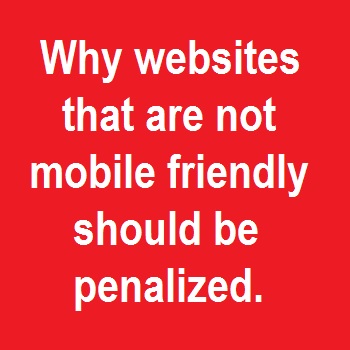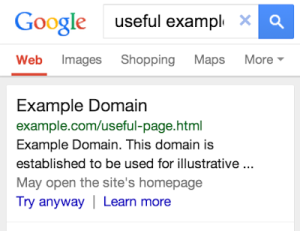 I recently ran into a site owned by an attorney. It was a nice looking website. There was nothing visually wrong with it, at least I thought, until I tried to view the site on my phone and got redirected to a mobile site. The mobile site was a nice looking page with an icon to email and an icon to call the law firm. This is a terrible idea. The attorney had been trying to figure out why is site was performing poorly in the search engines. This (and a lack of content) was the problem.
I recently ran into a site owned by an attorney. It was a nice looking website. There was nothing visually wrong with it, at least I thought, until I tried to view the site on my phone and got redirected to a mobile site. The mobile site was a nice looking page with an icon to email and an icon to call the law firm. This is a terrible idea. The attorney had been trying to figure out why is site was performing poorly in the search engines. This (and a lack of content) was the problem.
There are typically 2 types of mobile unfriendly sites I run across:
1. The site that displays incorrectly on a cell phone. Severity varies from inconvenience and difficulty of use to being completely unusable.
2. The mobile redirect site. This is the site that sends you to a completely different page that you did not intend on visiting. These sites often look like apps. They are interesting and easy to use but they are not even an option these days.Think about it- if you pull out your phone and google how to build a chicken coop, you want to see the content or resource that someone put together on how to build a chicken coop, not get sent away to an app like screen with a phone number and email form on it.
Searches via mobile devices will soon outnumber searches from desktop computers.
It is no secret that searches via mobile devices will soon outnumber searches from desktop computers. Search engines want to take people to the resource that they are looking for, plain and simple. This why they were invented in the first place.
Why Search Engines should penalize your site.
If your site is unusable, it should not be on the first page of the search engine results page (SERP). If you are having a hard time grasping this, let’s look at it backwards for a second. Let’s pretend that searching was always done on a tablet, then one day laptops and desktop computers became popular. You sit down at your shiny new desktop computer and fire up your favorite web browser and go to your search engine of choice to look up how to build a chicken coop. You perform your search query and up comes some results. One is titled “How To: Build your own chicken coop in 4 hours for $50”. You click on the link, and you are taken to a page which is so difficult to use that you back off of it as fast as you can. This website is unusable. Not only do search engines desire to take people to the page they want, it is how they make themselves and their shareholders money. If every time you sat down at your nice desktop and used search engine xyz.com and it kept wasting your time by taking you to websites that are completely useless, you’d quit using search engine xyz.com and locate an alternative. In short, if the website is unusable people should not be getting to it.
Also…
Search engines already measure the time users spend on a page. If someone clicks on to your site and back off in 6 seconds, that tells search engines that whatever you had shown up for in search is not relevant to what the user was searching for.
The solution.
The solution is a responsive website design. A responsive site rearranges itself as it is shrunk down in size depending on the size of the screen it is being viewed in. If you need a responsive website that can have content easily added to it, chances are WordPress is going to fit the bill. Visit our Responsive Website Design Page for more information on these.
UPDATE 6/4/2014:
Today Google announced websites using “faulty redirects” will add new text to people using smartphones. If your website was showing up for content, or articles, and sending people off to an irrelevant mobile website, the page will now have a warning displayed under the search result which reads “May open the site’s homepage”. Read all about the latest update here. This basically tells people if they click onto your site they may not actually get to the page they’re looking for. Gee, nobody saw that one coming! 😉
What the warning will look like:
- Google “Pure Spam” Penalty Deindexes Sites March 6 2024 - March 12, 2024
- What Happened to ChicagoNow.com? - August 30, 2022
- The December 2021 Google Local Pack Algorithm Update - December 17, 2021





Leave a Reply